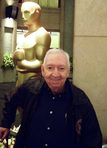Jack Fitzgerald's Blog, page 9
March 5, 2015
Voice and Style
Reviews of my latest book MURDER IMPOSSIBLE are starting to come in. I am pleased to say that they have so far all been very positive. You may read some of them in “The Reviews Are In” link in today’s blog. I hope you will go there and see what some reviewers of my book have said. I’d also appreciate it if after you have read the book, you will write a review and add it to this link.
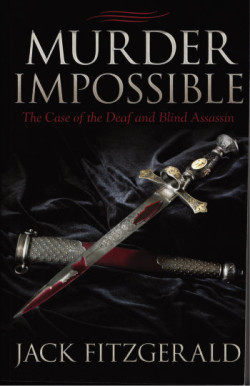 Here are some statements reviewers have recently made about my book MURDER IMPOSSIBLE:
Here are some statements reviewers have recently made about my book MURDER IMPOSSIBLE:
“I loved feeling like I was really on a cruise somewhere and not stuck inside with all this dreary snow!”
“Jack Fitzgerald infuses a unique blend of mystery, drama, romance, adventure, and shocking turns. “
“We feel like we are a part of the book.”
“I enjoyed the author’s voice and style of writing.”
It was an easy read that held on to my attention from start to finish.”
“Some of the best characters I’ve come across in a while….All unique and quirky.”
“I totally got hooked on the creative plot and fell in love with the characters.”
I didn’t just choose the juiciest phrases from the different reviews. I selected six sentences that would illustrate the themes of this week’s blog: Voice and style. I will add another statement that several of my close friends who have read my works tell me: “It sounds just like you talking.”
One day when I was age 17, my brother asked me a question after reading a couple of pages of my inventiveness. “Who do you think might read this?” I had no idea. I thought you just wrote and that people would publish it and other people would read it. Wrong,, wrong, wrong.
It took me years to realize that writing is a case of planned effort. You must write to someone—not just haphazardly let the chips fall where they may. Most of all, when you write you must have a plan and a purpose. These are where a writer’s voice and style come into play. Over the years, I began to see what made Oscar Wilde and Ernest Hemmingway completely different writers.
I wrote off and on for a few years but until I moved to France at the age of 39, I never found my voice in writing. “Voice? What is voice as it pertains to writing?” you’re most likely saying. The answer is: Voice is the personality of the author imprinted onto what he writes.
Before anything though, the author needs to determine the goal of his writing. Are you attempting to inform, persuade, or entertain? This part of your writing is called “style.”
You have TWO types of STYLE.
Business and Technical Style: They use a lot of long, obscure words and the sentences are mostly lengthy. A certain stiffness is thought of as not only acceptable but preferable. This style is unfriendly and keeps the reader at a formal distance.
Conversational Style: Here you use personal pronouns, contractions and everyday words and phrases. Its purpose is to be friendly, sociable and accessible.
Therefore, a writer’s voice includes his or her combination of syntax, use of language, punctuation, character development, dialogue and plot. Voice is what makes one author unique to another. It’s what leads the reader to a subjective, emotional state of mind while reading a work. Voice is the distinct personality of a piece of writing. It’s what lets you feel the difference between reading a legal textbook and Fran Lebowitz. One is dry as toast and the other will have you laughing in stitches.
So how does one get this elusive “voice?” I suppose you could study and mold yourself over time. How do you know if you have a distinctive voice? Listen to your reviewers and readers. Re-read the statements at the opening of this blog and you will see that the reviewers are all reacting emotionally to my writing. That is when you know you have found your voice.
So, how did you find your voice? I went to live in Paris, France, and accidentally found my muse—muse being a word that can be used for the word voice.
We were putting on a two-character, one-act play of mine in Paris. It was a pretty turgid thing called KILLING TIME. One thing I didn’t realize. This play was not going to be well received because it had no “voice.” It was stiff and talky and at times humorous. In other words, it was all over the place. It was neither fish nor fowl. That is when my muse arrived and took over quite by accident.
One of the two-characters quit the night before our opening. We were in a real jam. What to do? In desperation, the husband of the woman playing the other character in the play volunteered to do the part in drag. I quickly rewrote certain parts of the play because somebody in drag saying some of my original solemn lines would be laughed off the stage. I quickly cut the long, declarative sentences, shortened some of the unfriendly long words and made it into a full-fledged comedy. We opened the next night. We were originally scheduled to run for 4 performances. Thanks to my muse, it ran for six weeks.
My career was born. I had found how to put color into my writing. I haven’t stopped since. That woman’s quitting is directly responsible for reviews such as you will find in the link “The Reviews Are In.”
Add some color to your writing life via voice and style. You won’t regret it.
February 26, 2015
Oscar Wrap 2015
Can you believe it? The Oscars actually have come and gone. We all saw the highs and lows, nice clothes, winners, losers, in-memoriam snubs (Joan Rivers and Eileen Stritch) and synchronized gaiety. Now it’s time to reflect on what all that actually meant to our daily lives. The weird moments, seating arrangements, tears, laughter and, well, our worn-out behinds are the lasting results. I saw actors crying, directors hugging, spouses being cute, and Oprah Oprah-ing. Oscar 2015 this year was being led by that graceful, witty, cute, preppy cheerleader, Neil Patrick Harris.
Harris seemed a bit stiff as though his neck was getting sore from craning to keep up with his cues on the teleprompter. His tenure to me seemed exactly the opposite of his Tony hosting gigs. Of course, in NY, he’s allowed to be himself and who he is, with lots of gay references and ad libs. In Hollywood, where no male actor is allowed to be gay, he seemed to be straight-jacketed into snarky Vegas-worthy material that would have better suited someone like Seth MacFarlane of last year’s infamy. Appearing nearly nude at one point in an attempt to ape a scene out of Birdman did not kick up the proceedings a notch as expected. Not an Oscar-worthy moment the critics twittered about his twat.
The whole experience made me wonder whether I actually liked Harris as much as I thought I did. But that’s not quite fair. He’s an actor who was trying to play a role as written and directed by others. It’s really just the accursed nature of the Oscar broadcast, whose principal mandate is to fill out nearly four hours with maximized ad revenue and commendable poppycock. The thing lumbers on and on and finally they jam the big awards into the last 15 minutes. The ponderously unfunny script always seems to be written by the same accounting firm that counts the votes. Neil’s third-rate David Blaine thing with the sealed predictions in a box, and his forced attempts to get some shtick going with Octavia Spencer completely backfired and seemed to have embarrassed Ms. Spencer no end. He just would not stop. (I appreciated that when Harris tried to drag Robert Duvall into it, Duvall gave him nothing.) Seriously, and I know this is heresy of a high order, but Seth MacFarlane was funnier last year. At least he had the courage to make an ass of himself with a grin on his face. Even James Franco and Anne Hathaway were … well, OK, no they weren’t. That event – the hip, cool, millennial youth-culture Oscars that weren’t — has been expunged from our memories.
The Imitation Game won an Oscar for Best Adapted Screenplay, written by Graham Moore who gave a heartbreaking yet inspiring speech. When Moore walked on stage he gave his thanks to everyone who was involved with the film, but he also revealed a personal detail about his life growing up. When he was 16-years-old, he tried to commit suicide.
The writer went on to talk about how he always felt “weird” when he was younger and it took him a long time to accept that. So he let others know that if they feel unhappy with their own weirdness, that’s okay. He also hoped they would continue to encourage others to stay that way. The audience gave Moore a standing ovation. Many in the theater and at home may have thought Moore was talking about being gay, but he wasn’t. If you look him up, you’ll see he isn’t gay. Even so, he did promote a person’s right and privilege to be different from the crowd. His speech, I perceive, came from a person who was extremely bullied when he was young for being a geek—not a gay. The audience, and the Internet, had a powerful reaction to Moore’s positive message.
Patricia Arquette, who won Best Supporting Actress, used her allotted acceptance speech time to plead for equal pay for women. This caused Meryl Streep to shoot up out of her seat in agreement. Perhaps it was her way of promoting a pay raise for herself.
John Legend and Common after having finished a captivating performance of their song “Glory” from the film Selma were brought back on stage to accept the award for Best Original Song. They made compelling speeches in favor of all minorities and showed what was at the heart of the film Selma.
Melanie Griffith and her daughter, current sexpot Dakota Johnson, while being interviewed on the Red Carpet before the show got into a squabble in front of one billion people. The scene was quite embarrassing for all who watched and listened in awe.
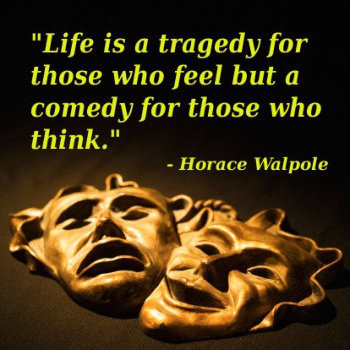 Over the evening there had been references building up to a featured appearance by Lady Gaga. Everyone was sure she was going to do one of her outrageous turns and could only guess what it would be. Finally her time came and she knocked the socks off the nation by showing what a wonderful voice she has with a compilation of songs from Sound of Music. She and Julie Andrews hugged and Lady Gaga now has suddenly been re-discovered and certainly has strengthened her career. She turned out to be the delightful surprise of Oscar 2015.
Over the evening there had been references building up to a featured appearance by Lady Gaga. Everyone was sure she was going to do one of her outrageous turns and could only guess what it would be. Finally her time came and she knocked the socks off the nation by showing what a wonderful voice she has with a compilation of songs from Sound of Music. She and Julie Andrews hugged and Lady Gaga now has suddenly been re-discovered and certainly has strengthened her career. She turned out to be the delightful surprise of Oscar 2015.
The film Birdman took four top awards and its director, the Mexican Alejandro González Iñarritu, won three Oscars for writing, directing and best picture. He used his speech time to plead for a decent immigration policy.
In my last week’s blog, I spoke of the Oscars being about business. This year it apparently was not. The highest grossing film, American Sniper with over 300 million already at the box office was snubbed and only won an Oscar for Sound Editing. The top four winning films (Birdman, Boyhood, Whiplash and Theory of Everything) are all small indie films which winning will hardly help.
So, how did I do with my winning predictions? Was I a big winner? Did I really know how to pick them? I got four out of six, which is okay but nothing fabulous. I should have gotten all six. I chose Bradley Cooper as best actor because I thought he played one of those Oscar unusual characters and also because the film is doing so well at the box office. I also missed Original Screenplay. I chose Boyhood and not Birdman. How did you do?
Cheers and now you can get ready for Oscar 2016. Any ideas of what might be on that platter?
February 19, 2015
Oscars 2015
—Warren Beatty
The yearly Academy Awards began in 1927, coinciding with the advent of sound. Hearing actors talk gave way to Hollywood’s using this yearly show business “conference” mainly as a means of advertising its wares for the year. That is still its mission statement right up till this year’s celebration on Sunday, February 22. To Hollywood, it is business as Warren Beatty said. Their main ploy is to bring in extra millions off of their films.
To the public, however, Oscar season is all fun. It is our opportunity to see Hollywood actors at play. The stars play dress up and we see them trying to show themselves off as real people rather than fictitious characters. In recent years, the red carpet arrival has resulted in a preening contest known as “name the fabulous dress designer.” This spirited pastime consists of making tacky comments about the arriving actresses (and actors too) and their costumes for the evening. Some are ridiculed and others are actually complimented. Joan Rivers revitalized her late-life career by making catty and clever comments about the dresses of the famous as they passed by. Actors and actresses are interviewed as they pass down the red carpet on their way into the venue for the Oscar presentations. Some become befuddled when a microphone is thrust into their faces. Every now and then we get to see a star make a fool of himself or herself. The public eats it up.
During the early years of the Oscars, the winners were announced beforehand. The first Oscars started off with only 12 categories of awards and the winners were announced three months before the Awards Banquet took place. However, soon the powers that be discovered they could make for a better program if they kept the winners a secret until the very last moment. Such secrecy soon became the backbone of the ceremony and thus launched thousands of Oscar parties where people vied for prizes.
Even though the Oscars began in 1927, it wasn’t until 1952 that they came into their own. That was the first year the awards show was seen on TV. The event became one long commercial, consisting of one-part live beauty pageant, one-part carnival and one-part heart-stopping guessing game. We see winner and losers but most importantly we see Hollywood in all its glory.
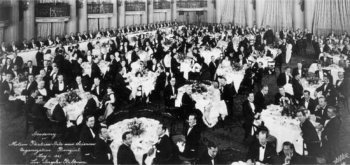
Academy meeting, 1927.
The Academy of Motion Picture Arts and Sciences (whose offspring is called Oscar) started off in 1927 as a sort of super union. Only the cream of the cream was invited to join and they were mainly the producers. Others soon felt left out like writers, actors, directors and certain craft groups. They quickly saw that the producers were not going to do them any favors so they each formed their own union. Today you have the Producers Guild but also the Writers Guild, SAG (Screen Actors Guild) and Directors Guild. Each wanted and demanded a piece of the pie. Thus the Academy ended up no longer a super union but a theatrical umbrella to embrace the brand known as HOLLYWOOD. Having awards would be the best advertising they could possibly ever hope to have
The first year all the films up for Best Picture were silent. The JAZZ SINGER, the first talkie, was put in the technical awards category. However, the following year all films up for Best Picture were talkies.
Today billions of people see the Oscar presentations all over the world and it has become the premier marketing tool of the Hollywood film industry. The telecast is like one long commercial whose principal aim is to separate you from your money. The yearly show is a chance to see film clips of all the films vying for the public’s attention. At the same time, you get to see leading stars hand out statuettes while doing a little telepromter hokum hitched up to showing how successful their dental work has turned out.
What became obvious over the years was that the voting by the members of the Academy was anything but scientific. Oscars weren’t handed out via any logical pattern. In fact no way existed to tell who would win a coveted Oscar. For example, the director John Ford won six Oscars over his career while Alfred Hitchcock never won even one. They have a catch all for such errors and it’s called the “Outstanding Achievement Award.” This is given to someone who may have been nominated several times but never won. It’s kind of a “consolation” prize to cover up Academy voting that has somehow gone awry.
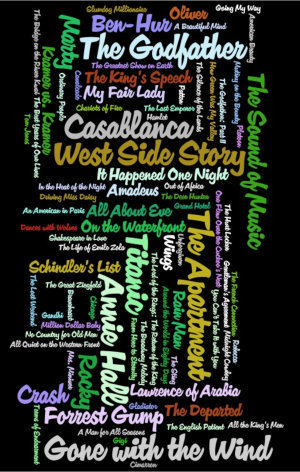 Basically each year’s Oscar awards are a snapshot of life for that year. Mores changes annually and one year’s super-intelligent-fabulous film is next year’s piece of crap. Supposed critical successes can over time be thought of as total turkeys. Likewise, some totally overlooked films can become classics. An example of this would be 1932 when a film called “Cavalcade” won best picture. Ever heard of that film? All 9 films that lost are seen over and over on TV these days. Among them are “Little Women,” “42nd Street,” “She Done Him Wrong,” etc.
Basically each year’s Oscar awards are a snapshot of life for that year. Mores changes annually and one year’s super-intelligent-fabulous film is next year’s piece of crap. Supposed critical successes can over time be thought of as total turkeys. Likewise, some totally overlooked films can become classics. An example of this would be 1932 when a film called “Cavalcade” won best picture. Ever heard of that film? All 9 films that lost are seen over and over on TV these days. Among them are “Little Women,” “42nd Street,” “She Done Him Wrong,” etc.
The film “Brokeback Mountain” in 2006 which was Hollywood’s first major gay love story lost to the safer choice “Crash” as Best Picture. The leads and the screenplay of Brokeback were all snubbed even thought Ang Lee won an Oscar for Best Director. The apparent problem seemed to be that the USA was several years away from gay weddings and even a hint that two macho guys could love one another. It just wasn’t in the cards for the voters of the Academy. Right now Brokeback Mountain is shown over and over on TV but I don’t remember seeing “Crash” once since it won. Even so, these days gay camaraderie as shown in Brokeback is relatively tame by what you see on TV and in film. Just shows you how less timid film stories have become in 9 years.
Presently that certain day upon which the Academy ceremony falls, the world almost stops breathing. Office pools, Oscar parties and all sorts of people get together and try to outguess the Academy’s 6,000 voters. Every type of betting goes on. Newspapers, magazines and internet sites all carry contests. (I even won a Marilyn Monroe cookie jar on an internet contest one year.)
HOW TO WIN: First of all, just because the people in the Academy who vote are or have been in the film business does not necessarily make them know a good film from a bad one. In such cases, they generally will give the Oscar for best film to the movie that contains a highly unusual person at its centerpiece. This could be the story of a blind, left-handed welder in a horseshoe shop in Lost Balcony, Texas. Look over this year’s crop of movies. You have a sharpshooter from Texas, a very disabled scientist from England and an eccentric actor who used to be in a TV show called Birdman —not to mention a homosexual who just happened to have invented the modern computer. Tough choice but that’s because they’re all odd in one-way or another.
Then you have to look at the films that employ the most people. Cast of thousands, reconstruction of ancient Rome, actors who are uprooted to some god-awful location near a mosquito infested river in Africa. And don’t forget motherhood and apple pie. If a film moves one to tears but in a classy (not low-class way), the members seem to zero it in for attention. And note this: it is rare that a film will just win best picture – its director will generally win too. Most of all though, forget your personal taste and favorites as that will generally cause you to lose the Oscar pool. Instead, concentrate on the things written in this and the preceding paragraph.
Now, to put myself out on a limb, I’ll make six predictions. I could be wrong on all of them but that would just show that I was being normal. Remember, you are biased if you merely vote for your favorites.
So here are my predictions for winners of an Oscar in 2015:
Best Actor…………………….…Bradley Cooper (died a hero for killing over 100 people)
Best Actress………………….…Julianne Moore (she has Alzheimer’s for goodness sake)
Best supporting actor………….J. K. Simmons (because EVERYBODY says he will win)
Best supporting actress……….Patricia Arquette (because she was very, very good)
Best original screenplay………Boyhood (unusual—took 12 years to write)
Best picture of the year……….Birdman (not one but a whole gang of kooky people)
So, it’s a wrap. This coming Sunday evening you will again enter the fantastic world of Oscar. Let’s hope you win that pool or maybe just your own player’s list. And of course, we’ll see how I did. Remember, this is the most unscientific betting scheme in the world. The real game here is Hollywood’s interest in your going out and leaving them money at the box office.
And the Oscar goes to . . .
February 12, 2015
Writing Q & A
I get a lot of questions about the craft of writing at book signings, book clubs and even from my barber. I thought that it was time to make public a few of the replies I give. I’m not saying that I have all the answers, but I have learned a good bit from being in the professional writing business for forty years. (By professional, I mean earning money from writing.)
Why are there so many people writing books these days?
As I stated in last week’s blog, producing a book has never been easier. In days of yore, people like Dickens and his crowd had to use a quill and dip the thing in ink every fifteen words. Can you imagine how dedicated you’d have to be to write a 300- page book? It would literally take you a very long time to rewrite it in longhand several times until you had it just right. How many people would do that these days? Very few, I can assure you. Nowadays with an electronic keyboard (or you can dictate via a program called Dragon) you can just whiz through 300 pages in no time.
There were very few publishers in those olden days of the past and all typesetting had to be done by hand. What a chore! Then the illiteracy rate was very high and just the rich and well off could afford the time for reading—much less the price of a book.
In the not too distant past, you had to spend all sorts of time trying to find an agent who would represent you. You could send out hundreds of query letters or send your book to publishing firms and that could be maybe forty or fifty trips to the post office. Nowadays, you can contact one of many companies who will print your “great American novel” via print on demand (POD) for a very reasonable price. The only tack in your path to becoming the author of your dreams is marketing your book. The market is flooded so nobody is making any money except the brand-name authors.
What is POD (print on demand)?
This is basically a new miracle machine that can spit out one copy of your book or forty, invoice it, package it, apply postage and a human hand has never touched any element of its getting into the hands of the reader. No warehouse is needed any longer, which is a gigantic savings for these POD publishers. So, you can write a book with the help of all those robot programs I mentioned in the last blog and have a finished product in someone’s hand in a matter of weeks. As a bonus, most books are printed as ebooks (Kindle, Nook, etc.) Hence no paper expense necessary. These books can be in your electronic reader in a minute’s time.
In the past, the quest for an agent and publisher could take a couple of years and you considered yourself lucky to have gotten one or both when all was said and done. Then the publishers were slow in their editorial departments and printing and distribution. That could add another year or so right there. In the past, it could take a would-be author years to come up with a product. In our present time, the entire process takes just a few weeks. Hence, tons of new writers. The only problem is where are the readers for all these books? This leads us to our next question.
How much does a writer make these days?
Most authors make less than $1,000 a year, according to a new report from Digital Book World. Almost 80% of POD authors and more than 50% of traditionally published authors earn less than $1,000 a year, according to the report. Surprisingly 90 percent of first-time authors made nothing. Only 5% of writers make as much as $20,000 a year.
Does any of this discourage new writers from trying to pitch their hats into the ring?
Absolutely not. Books are being published at a rate six-times of what they were four years ago according to the Bowker Company, who handles the ISBNs for books. Yet reading of books has declined dramatically over the last few years. Many people simply do not read books for one reason or another. Some have no interest, some are only attuned to TV and films and some due to dyslexia. At any rate, more books and fewer readers equal less money to be made if you pursue this profession.
What makes someone become a writer?
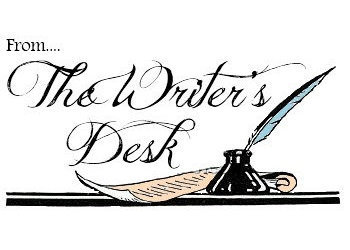 Ego for one thing. This means deep down you have a calling to tell stories and at the same time get your point of view off your chest. Ego could also account for a certain set of people who see it as a glamour profession that makes them stand out from the crowd. “I’m a writer.” Either way you slice it, you either have to have a real nine-to-five job to support this habit of yours—or you’re in that fabulous group who makes over $20,000 a year.
Ego for one thing. This means deep down you have a calling to tell stories and at the same time get your point of view off your chest. Ego could also account for a certain set of people who see it as a glamour profession that makes them stand out from the crowd. “I’m a writer.” Either way you slice it, you either have to have a real nine-to-five job to support this habit of yours—or you’re in that fabulous group who makes over $20,000 a year.
Any ideas concerning the future of the writing profession?
No. There will always be a certain number of writers in our world no matter what. They have the calling even if the return is very low. The only hope is that the super-ego people will find something else eventually in which they can channel their quest for fame and fortune. What that could be, I have no idea. The careers of film making and writing suffer from the same maladies during the present time. With the advent of very fine quality video cameras for a reasonable price, everyone is making his or her own movie. So, who knows what the next outlet for mankind’s ego will be? Whatever it turns out to be should be very interesting to observe though.
February 5, 2015
Robot Writing
Welcome to the 21st Century where excess in all things is the norm. We have more of anything than in the history of man. The most salient example is when grandparents tell their grandchildren the difference in things when they were young and now. My great niece is 7 and she is a whiz on the computer. I fully expect she will write her life story any day now.
So for a minute, let me be your grandfather and do a little time traveling. When I was a kid, we had exactly two places in my hometown where you could get a hamburger and the price was ten cents. We have thousands of places these days to get a hamburger and the price has jumped as high as twelve dollars. Even one of our popular fast food places has what they call the “six dollar hamburger.”
This blog isn’t about hamburgers but it shows that the vast difference in a hamburger of yore and today has carried over to every strata of our society.
This blog is about WRITING. So what has happened in that field that might compare it to a hamburger? Let’s see, it would be just as well to start at the very beginning of mankind. We had some people even in those distant times who wanted to tell stories to others. The tools of a writer’s craft have constantly evolved through history, from oral storytelling, through quills and typewriters, to the modern computer.
When I took typing with Mrs. Evans at Okolona High School in my senior year, I thought I had entered a futuristic world. My parents couldn’t believe that I was learning to type on a blind keyboard (no letters visible) and I didn’t have to hunt and peck. I was kind of like a “little robot” one of my aunts said. The minute I made that A in Mrs. Evans’ class I knew I was on my way to authorhood. That’s when I wrote my play GOOD GRIEF— which I told about in the last blog. I could never have worked my way through three acts of dialogue if I had had to use a hunt and peck system of typing.
One big problem still existed in typing. If we made a mistake, we had to erase and retype over the mistake. Then some genius came up with little sheets of white paper. Upon their appearance on the scene, I had a sense that I was seeing the future and it was making my creative writing much easier to produce. At that time I was in Paris and writing those plays for the Paris English Theatre. I had advanced to using an Olivetti portable. It was cute and I could bang stuff out coming and going on that handy-dandy little machine coupled with those little white papers.
 Then toward the end of my stay in Paris, someone came up with a white liquid and I thought they had to be a genius from the future. Typing became even more simplified. All I needed was talent, that little Olivetti and a bottle of white out.
Then toward the end of my stay in Paris, someone came up with a white liquid and I thought they had to be a genius from the future. Typing became even more simplified. All I needed was talent, that little Olivetti and a bottle of white out.
Then I went to Hollywood and was greeted with the electric Smith-Corona and its cartridges for typing and correcting. I thought the art of typing had become sensational. Then a couple of years later, along came the computer with its word-processing program. I paid a fortune (nearly a thousand dollars) for my first word processor—a Kaypro. I was sure that was the end of the line as far as possible development of writing instruments for the writer. No longer did we have to erase or white out. If we had to change the name of a character or edit, we could push a button and the computer would do it effortlessly for us. Then someone invented spell check and it instantly cured me of one of my major writing problems. Later grammar check came along and became my own private syntax cop.
What else I thought? What could possibly be next? Believe it or not, welcome to the day of the Robot Writer. Nowadays everyone can be a writer if they have the price of a laptop or desk computer. Talent? Who needs it? People are writing their heads off these days. We have the internet and that coupled with the computer has thrown us into another world as far as the profession of writing goes.
There’s a lot to read and watch on the internet. In just SIXTY SECONDS, 278,000 Tweets are sent, 347 posts are published on Word Press, and 72 hours of footage are uploaded to YouTube.
On Facebook, you have 1 billion messages per 24 hours. If you think this is amazing, please pay attention—it’s only getting worse (like really, really bad. People not only tell you what they are eating for lunch but post cute and clever homilies about their being liked. Example: Before you judge me, make sure you’re perfect.)
 According to The Bowker Report (the people who issue ISBNS) over a million and a half books were published in the U.S. in 2014, which is more than triple the number of books published six years earlier. More than two thirds of these books are self-published, print-on-demand books, which is where most of the growth in recent years has taken place.
According to The Bowker Report (the people who issue ISBNS) over a million and a half books were published in the U.S. in 2014, which is more than triple the number of books published six years earlier. More than two thirds of these books are self-published, print-on-demand books, which is where most of the growth in recent years has taken place.
Book industry sales are declining, despite the explosion of books published. Book sales in the U.S. peaked in 2007 and have fallen every year since, according to the Association of American Publishers. Average book sales are shockingly small, and falling fast. Combine the explosion of books published with the declining total sales and you get shrinking sales of each new title. According to Nielsen BookScan – which tracks most bookstore, online, and other retail sales of books (including Amazon.com) – only 282 million books were sold last year in the U.S. The average U.S. nonfiction book is now selling fewer than 250 copies per year and fewer than 3,000 copies over its lifetime.
So what is happening? Everybody is a writer who wants to be one—even if you have no talent for it. Let’s say you don’t know how to make up plots, names of characters, story conflict or story line. No need to worry. Just go to Google and type in “writing software.” You’ll see there are dozens and dozens of programs to help you write your book, play, or screenplay. The top programs are WriteNow, WriteWay Pro, Scriveners, Dramatica Pro and dozens of others. They range in price from thirty dollars to a hundred and fifty. Order one and you’ll be on your way to becoming one of these new modern Robot Writers you see by the dozens at Starbuck’s.
Where is this all taking us in the field of creative writing? Who can predict? It just reminds me of that old funny saying that used to be pasted on office walls: Last week I couldn’t spell kat and this week I are a secretary.
I should have known years ago when they came out with those paint-by-number kits that one day there would be a write-by-number novel kit.
So whether you’re looking to be the next J.K. Rowling, Stephenie Meyer or John Grisham, just giggle over to Google and with a touch of a key, your Robotic future in writing awaits you.
January 30, 2015
Murder Impossible Giveaway
Do you want a FREE copy of Jack’s latest book MURDER IMPOSSIBLE????
Thanks to GOODREADS, one of the major book reading sites on the internet, a big giveaway deal is underway until February 17, 2015 for a free copy of MURDER IMPOSSIBLE. Winners of these free books will be asked to write a review and submit it to GOODREADS for publication.
Help spread the word around about his book and you may get a copy absolutely postage-paid FREE. Go to this link right now and join the MURDER IMPOSSIBLE GIVEAWAY!!!
It takes only a minute and you could be the winner of your very own FREE copy of MURDER IMPOSSIBLE!!!!
January 29, 2015
Writing 101
A couple of years back when I returned to Mississippi for a class reunion, I got asked all sorts of questions about my writing career. I hadn’t seen the woman I was staying with in well over fifty years. As children we were very close. She had in those fifty years apart collected five grown sons and a lot of grandchildren. At dinner one evening, her oldest son looked me in the eyes and asked, “How long did it take you before you made any money in the field of writing?”
That is a provocative question because income is a very elusive part of the writing game. Most people just want to write. They are hoping that some fairy godmother or godfather will drop out of the sky and make them rich and famous. Sorry, it doesn’t work that way.
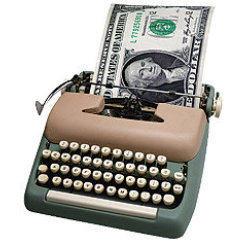 I answered the question by replying that I was forty years old before I ever made any money to speak of in writing. I’ve answered this question many times before and I always know the reaction to my answer. It’s a follow-up question that asks how long did I keep at writing before I had any income. In my case, the answer is that I started writing when I was about twelve years old. Then I do the math for them. It took me twenty-eight years. This was not the encouraging news my friend’s son wanted to hear because his daughter was studying for a Masters of Fine Arts in college. He said, “Well, I guess she can always teach.”
I answered the question by replying that I was forty years old before I ever made any money to speak of in writing. I’ve answered this question many times before and I always know the reaction to my answer. It’s a follow-up question that asks how long did I keep at writing before I had any income. In my case, the answer is that I started writing when I was about twelve years old. Then I do the math for them. It took me twenty-eight years. This was not the encouraging news my friend’s son wanted to hear because his daughter was studying for a Masters of Fine Arts in college. He said, “Well, I guess she can always teach.”
Most often after I have answered those two questions, the topic drastically changes to discussing a movie everyone has seen or wants to see or some restaurant they’ve just visited. In other words, most normal people think one is a bit balmy to spend 28 years trying something and not getting ahead. It’s kind of like Einstein said, “The definition of insanity is doing the same thing over and over again, but expecting different results .”
I suppose that qualifies me as crazy. However, I suppose some people have bought lottery tickets for 28 years and have never won anything over five or ten dollars. Then they would have to be thought of as crazy too.
That’s the writing game for you. It’s a lottery game. Some people win the jackpot right away and others it takes a little bit shy of forever to kick in—if indeed it ever does. Writing (like buying lottery tickets) is addictive.
Writing generally starts out as a hobby—such as it did when I was twelve years old. After a certain period of time though, you begin thinking about ways to make money out of this pastime. You then try sending what you’ve written off to people in hopes of gaining exposure. In the process, you continue learning as much as you can about the profession with the longing that some “yes” person will nod in your direction.
I suppose there are those who keep journals and write but never try to do anything with their literary output. Writing is kind of a catharsis for them so they’re not part of this discussion.
Most writers though are just like lottery ticket buyers. The money connection becomes very much a part of the equation. I can safely say that at one point in a serious writer’s life, the word marketing must take precedence over what you are writing. It has to or you will never make a dime out of your efforts. Literary purists at this point may be outraged that I would attach filthy lucre to their lyrical visions of life.
In my own case, I realized very early on in my writing that poetry was not my thing. I had several professional poets in my family and they published books of poetry or had poems printed in magazines and newspapers. I saw via them that very, very, very few people made a buck out of poetry. Even in spite of that fact, poets these days are still a robust part of the writing community.
I then thought of writing short stories. I found that I could write them but that absolutely no one wanted them. Besides, their fiscal value was not too far ahead of poetry. Of course like the lottery, somebody wins but a heck of a lot of people lose.
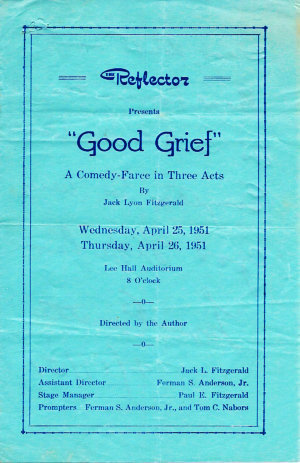 The first year I was in college, I wrote a play called GOOD GRIEF. My rationale for choosing this new form of writing was that it was easier to have an audience, being that all you had to do was get together some actors and have at it. In the process, you actually might generate a few bucks. So, my play was put on at Mississippi State University and actually some money was made off the project. I knew I had found my venue. I think I made something like fifty bucks but, hey, that was much more than I ever got from any other of my writing.
The first year I was in college, I wrote a play called GOOD GRIEF. My rationale for choosing this new form of writing was that it was easier to have an audience, being that all you had to do was get together some actors and have at it. In the process, you actually might generate a few bucks. So, my play was put on at Mississippi State University and actually some money was made off the project. I knew I had found my venue. I think I made something like fifty bucks but, hey, that was much more than I ever got from any other of my writing.
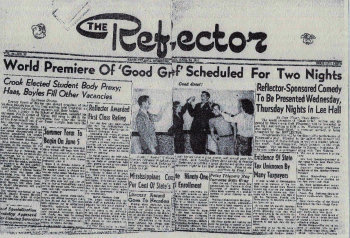 Fifty bucks was not enough to retire or buy a red Buick convertible but at last money had gotten connected to my little diversion. Then it only took me twenty more years of trying before I finally hit pay dirt in the playwriting department. That quickly changed into screenwriting, where I ultimately supported myself for quite a few years.
Fifty bucks was not enough to retire or buy a red Buick convertible but at last money had gotten connected to my little diversion. Then it only took me twenty more years of trying before I finally hit pay dirt in the playwriting department. That quickly changed into screenwriting, where I ultimately supported myself for quite a few years.
So, here you have all sorts of information in this blog. Writing is not a get-rich-quick profession except for a very special few (like lottery winners.) You can work at it and still never catch the brass ring. I suppose the thing that I am saying at the heart of this blog is that marketing is just as important or more important than that which you’ve written. The two properly wedded though can produce some positive results.
If you plan on writing and dream of making a few bucks in the process, it’s 90 percent perspiration and 10 percent inspiration. The alternative is to keep on buying those lottery tickets.
January 22, 2015
Anatomy of a Book
My latest novel MURDER IMPOSSIBLE is now as they say in French, un fait accompli—a done deal. I can now hold this book in my hand. It is a tangible thing. It is the other side of the rainbow of the expression “I’m going to write a book.” I must say, as any author would, that to hold the finished product in your hand is almost similar to holding your new son or daughter. This product of your making will now have to go out into the world and make a name for itself.
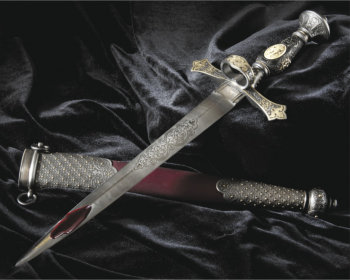 But how did this book come about? Did I just one day wake up and say that I was going to write a book about a blind assassin and then jump both feet right into its creation? No, that is not how MURDER IMPOSSIBLE was conceived. It took a lot of topsy turvey doings to see this thought go from an intangible to a tangible.
But how did this book come about? Did I just one day wake up and say that I was going to write a book about a blind assassin and then jump both feet right into its creation? No, that is not how MURDER IMPOSSIBLE was conceived. It took a lot of topsy turvey doings to see this thought go from an intangible to a tangible.
It all began 46 years ago. I was recovering from a broken kneecap. A pin had been put in and I was in a cast up to my hip. I was for the most part bed-ridden and then once the cast was off had to be in a wheelchair, then crutches, then a cane. Mobility had become something I dreamed about once again having one day. I was about to go nuts for something to do. I was at the time teaching high school Spanish but did not get to start the school year and was told I would be lucky if I could go back to my job in five months. What to do to kill time?
I took a cue from Margaret Mitchell, the author of GONE WITH THE WIND. She was laid up from an accident and her husband who was tired of bringing books back and forth from the Atlanta library for her suggested that she write her own book. So I decided that’s what I would do too. I would write a book. About what, I thought? Up to that point I had at best written a couple of plays and several short stories that had gone nowhere. What did I know about writing a book?
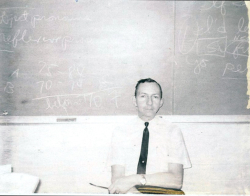 I was a schoolteacher (Spanish) so I figured I should write something about a high school. I decided to make my main character a female teacher because that way I could be more flighty and loosey goosey. If I wrote about a man teacher, it would have to be sports and the like because in the year 1968 men had had no liberation of their feminine side. It was all beer, belching, scratching your junk and who was going to win the football game. So a woman it was to be and she had to have a name. I wanted it to be a little unusual so I used “Olivia” which was an old maid who worked at the railroad with my father. My character’s last name “Haines” arrived due to the underwear I was wearing.
I was a schoolteacher (Spanish) so I figured I should write something about a high school. I decided to make my main character a female teacher because that way I could be more flighty and loosey goosey. If I wrote about a man teacher, it would have to be sports and the like because in the year 1968 men had had no liberation of their feminine side. It was all beer, belching, scratching your junk and who was going to win the football game. So a woman it was to be and she had to have a name. I wanted it to be a little unusual so I used “Olivia” which was an old maid who worked at the railroad with my father. My character’s last name “Haines” arrived due to the underwear I was wearing.
Okay, I had my leading character. So what was her problem? I decided to have her teaching English lit and being a bit old maidish—only because at that time the only alternative would be the “domesticated life of Olivia Haines.” This meant she would have had to be the social equivalent of our burping male—meaning a steel magnolia of some kind. So what was her problem? Obviously it was acceptance and trying to fit in, which she never did. The name I gave to my opus was “Teddy Bears Get Tired.”
I worked on this every day and it became a fantastic time killer. The project carried me from bed ridden to finally getting back into my classroom—five months to be exact.
Then I tried to peddle my book and that lasted actively for at least a couple of years. I did manage to get an agent to handle it but I had to pay her, which I didn’t realize was not the way it was done. She was a good soul and did let me know I could write but that what I had written wasn’t exactly the “great American novel.”
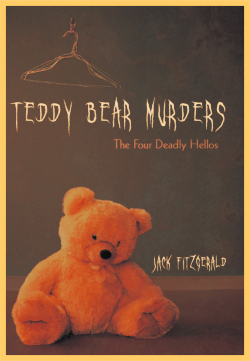 Teddy went into deep retirement after two years or so but followed me in all my different abodes world wide. Then three years ago, after all my years as a screenplay writer and with three books published, I unearthed Olivia and wondered if the old gal might have a life after all. I re-read Teddy and saw what that woman agent was talking about—the writing was okay but the plot was hardly enough to work up any enthusiasm. So, I decided to give Olivia a ride in the park and outfit her with a new plot—this time a murder mystery where one of her students, a sociopath, was out to kill her. Olivia came alive in my book TEDDY BEAR MURDERS.
Teddy went into deep retirement after two years or so but followed me in all my different abodes world wide. Then three years ago, after all my years as a screenplay writer and with three books published, I unearthed Olivia and wondered if the old gal might have a life after all. I re-read Teddy and saw what that woman agent was talking about—the writing was okay but the plot was hardly enough to work up any enthusiasm. So, I decided to give Olivia a ride in the park and outfit her with a new plot—this time a murder mystery where one of her students, a sociopath, was out to kill her. Olivia came alive in my book TEDDY BEAR MURDERS.
After it was published, I was surprised to find out how many people loved and read murder mysteries.. Many people requested a sequel to more of Olivia’s adventures. I came up with a new plot for our girl and sent her out into the world again in the just released this past week MURDER IMPOSSIBLE.
There you have the anatomy of Olivia and her two books TEDDY BEAR MURDERS and the now on the market MURDER IMPOSSIBLE. Olivia and I would be deeply appreciative if you’d pick up either or both and give them a read. We’d love to have you with us on Olivia’s new ride through the park.
Occasionally it takes a long time for an idea to see itself become fully developed, but Olivia is a perfect example. Ideas don’t die. They just lay in waiting.

